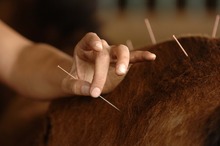Management of Equine Reproduction by Traditional Chinese Veterinary Medicine is the focus of a course being offered by a prestigious Italian Veterinary Clinic.

Using acupuncture in horse reproduction
The clinical evaluation concerns the stallion, the mare and the foal and is a course in "assisted equine reproduction" using traditional Chinese veterinary medicine.
The course addresses the physiopathology of reproduction in the medical branch that studies the biological process involving reproductive capacities and their disturbances, in preconception genetics and obstetrics in horses. The aim of this science is obtain a foal, that is most suited to its breed aptitudes and characteristics.
The clinical evaluation concerns the stallion, the mare and the foal and overall it is a course in “assisted equine reproduction”.
The Traditional Chinese Veterinary Medicine (TCVM) has shown a great interest in this range and ancient texts (1.300 b. C.) quote Acupuncture and Herbal protocols used in the breeding of horses.
Many scientific trials and many clinical studies have proved the efficacy of acupuncture in treating infertility, persistent winter anestrus, persistent spring transition, endometritis, abortion prevention, endocrine syndrome, parturition assistance, post partum diseases in the mare and cryptorchidism, low libido, poor sperm quality in the stallion and neonatal diseases.
The goal is integrative medicine applied to equine reproduction by a true comprehensive patient care strengthening the veterinary medical act by veterinary surgeons that are certified in Veterinary Acupuncture by Italian Societies or International Societies.
During the course of study, the anatomy of the genital tract in the mare and stallion; equine reproduction physiology; reproductive diseases in the mare and stallion; clinical methodology in equine reproduction (diagnosis, therapy); artificial insemination will be the main focus and will lead to a Master Thesis at the end of the course for those wishing advanced credits.
The workshops begin 20 – 24 February 2013 and continue:
- 18 – 21 April 2013
- 20 – 23 June 2013
- 03 – 06 October 2013
- 22 February 2014 – Master Thesis.
